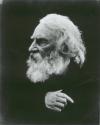Into the city of Kambalu,
By the road that leadeth to Ispahan,
At the head of his dusty caravan,
Laden with treasure from realms afar,
Baldacca and Kelat and Kandahar,
Rode the great captain Alau.
The Khan from his palace-window gazed,
And saw in the thronging street beneath,
In the light of the setting sun, that blazed
Through the clouds of dust by the caravan raised,
The flash of harness and jewelled sheath,
And the shining scimitars of the guard,
And the weary camels that bared their teeth,
As they passed and passed through the gates unbarred
Into the shade of the palace-yard.
Thus into the city of Kambalu
Rode the great captain Alau;
And he stood before the Khan, and said:
"The enemies of my lord are dead;
All the Kalifs of all the West
Bow and obey thy least behest;
The plains are dark with the mulberry-trees,
The weavers are busy in Samarcand,
The miners are sifting the golden sand,
The divers plunging for pearls in the seas,
And peace and plenty are in the land.
"Baldacca's Kalif, and he alone,
Rose in revolt against thy throne:
His treasures are at thy palace-door,
With the swords and the shawls and the jewels he wore;
His body is dust o'er the desert blown.
"A mile outside of Baldacca's gate
I left my forces to lie in wait,
Concealed by forests and hillocks of sand,
And forward dashed with a handful of men,
To lure the old tiger from his den
Into the ambush I had planned.
Ere we reached the town the alarm was spread,
For we heard the sound of gongs from within;
And with clash of cymbals and warlike din
The gates swung wide; and we turned and fled;
And the garrison sallied forth and pursued,
With the gray old Kalif at their head,
And above them the banner of Mohammed:
So we snared them all, and the town was subdued.
"As in at the gate we rode, behold,
A tower that is called the Tower of Gold!
For there the Kalif had hidden his wealth,
Heaped and hoarded and piled on high,
Like sacks of wheat in a granary;
And thither the miser crept by stealth
To feel of the gold that gave him health,
And to gaze and gloat with his hungry eye
On jewels that gleamed like a glow-worm's spark,
Or the eyes of a panther in the dark.
"I said to the Kalif: 'Thou art old,
Thou hast no need of so much gold.
Thou shouldst not have heaped and hidden it here,
Till the breath of battle was hot and near,
But have sown through the land these useless hoards
To spring into shining blades of swords,
And keep thine honor sweet and clear.
These grains of gold are not grains of wheat;
These bars of silver thou canst not eat;
These jewels and pearls and precious stones
Cannot cure the aches in thy bones,
Nor keep the feet of Death one hour
From climbing the stairways of thy tower!'
"Then into his dungeon I locked the drone,
And left him to feed there all alone
In the honey-cells of his golden hive:
Never a prayer, nor a cry, nor a groan
Was heard from those massive walls of stone,
Nor again was the Kalif seen alive!
"When at last we unlocked the door,
We found him dead upon the floor;
The rings had dropped from his withered hands,
His teeth were like bones in the desert sands:
Still clutching his treasure he had died;
And as he lay there, he appeared
A statue of gold with a silver beard,
His arms outstretched as if crucified."
This is the story, strange and true,
That the great captain Alau
Told to his brother the Tartar Khan,
When he rode that day into Kambalu
By the road that leadeth to Ispahan.






